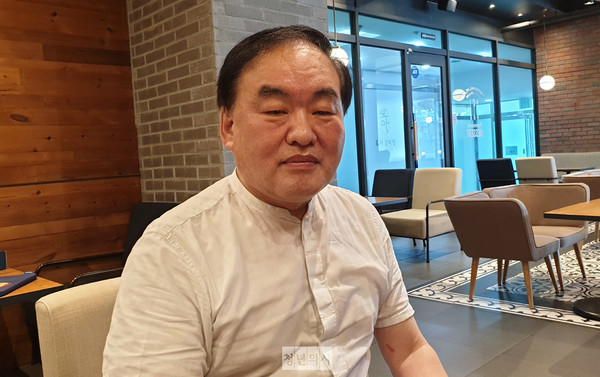The nation’s largest physician organization is taking steps to establish telemedicine as its official policy.
The Korean Medical Association (KMA) held a workshop in Busan over the weekend to discuss home treatment and telehealth and had a debate on contactless patient care.

Kim Hong-sik, chairman of the KMA Policy Special Committee, told reporters that the KMA was seeking to “define telemedicine, face-to-face care, and contactless care.” Kim operates Baesan Medical Clinic in Busan.
The KMA’s policy special committee will focus on the complementary relations between in-person care and remote care when developing agendas, he said.
Question: Why did you select “Covid-19 home treatment and telemedicine” as the theme of the workshop?
Answer: We introduced home care abruptly because of the Covid-19 pandemic. As an internal medicine clinic owner, I participated in the home treatment system and found many problems. One of the biggest problems was that patients, who are not professionals, tried to choose a treatment option. One Covid-19 patient wanted to get Paxlovid, a Covid-19 pill. After consultation, I found that the patient was not eligible for a Paxlovid prescription. When the patient heard the news over the phone, he said he would contact another medical institution to get the pill. This was a small example, but if the treatment choice is decided by the demand of patients, it will interfere with patient safety and proper treatment. If telemedicine is allowed for all diseases, its adverse effects will become more serious.
Despite such concerns, the country has already established legal grounds for telemedicine. For better patient convenience, the government is pushing to implement telehealth despite the opposition from doctors.
In this situation, the KMA Policy Special Committee will point out problems that may arise when introducing telemedicine and request improvement. In healthcare, patient safety and accuracy are far more critical than patient convenience. To solve this problem, we chose telemedicine as the workshop's theme.
Q: The Yoon Suk-yeol government is gearing up for a telehealth policy. Its national tasks include institutionalizing contactless patient care.
A: Whether to introduce telemedicine is being decided by economic factors, not by medical factors. Developers of telehealth solutions and medical devices for self-measurement are appealing to the government to allow telemedicine. And Korean people who tasted the convenience of home care are also demanding it.
When introducing telemedicine, we cannot make a judgment separating hospitals from clinics. A doctor’s medical practice is the same regardless of the place they work. If patient-doctor remote healthcare is allowed, a treatment decision based on the patient’s explanation will threaten the patient's safety and may lead to an inaccurate diagnosis. It is the same with the outpatient service at hospitals. Medical devices for self-measurement have poor reliability. If we have to introduce telemedicine, it will be possible only in extremely limited diseases.
Q: To what extent will the KMA Policy Special Committee discuss telemedicine?
A: Remote care is a tool to complement in-person care. We must define “complement” and set cases where telemedicine can be performed. Also, we are trying to make an agenda in detail about what it means to supplement face-to-face care. A related law is proposed in the National Assembly but the KMA Policy Special Committee will try to define telemedicine, face-to-face care, and contactless care, rather than discussing individual bills. The committee prepares a KMA policy and submits it to the board of representatives. We work on definitions and terms in a broad framework.
Q: Since the inauguration, the KMA Policy Special Committee has made nearly 100 policy proposals. It also showed a willingness to develop legitimate healthcare content.
A: Healthcare content development is one of the most important tasks for the KMA Policy committee. But to implement the task takes enormous capital and technology. As discussions for building the right medical content cannot be done without the KMA, the KMA Policy Special Committee should take initiative. Ridiculous healthcare information on the internet has become a source of income. Because of this, Korean people lose not only money but health. By establishing the right healthcare content, we will protect people from fake healthcare information.
Q: The KMA started establishing its own policies five years ago. But some point out that KMA policies are not as influential as expected.
A: Maybe that’s normal. I heard that the American Medical Association, which has a 140-year history, took more than 30 years to establish the basics of AMA policies. Defining healthcare policies based on evidence is not an easy task. Healthcare policies change every year and consumer needs become more diversified day by day. It is impossible to define these changes in just several years. It will take more time for the KMA to establish its own policies. Our efforts may fall short of expectations because there are differences in expectations caused by differences in understanding of healthcare policy development.
Of course, there are many things that the KMA Policy Special Committee has to rectify internally. But our overall activities have not been sluggish. I think the competence of doctors for healthcare policy development is insufficient compared to the demand. It is easy for physicians to shout slogans against government policies. But establishing a theoretical base for the policy and persuading it logically is like creating something out of nothing.
Healthcare policies differ from country to country, so the KMA’s committee has to build its own data on health and medical policies that fit the Korean context.

